Tepezza Lawsuit: Balancing Patient Rights and Pharmaceutical Interests
- Last Updated: February 16th, 2026
Key Takeaways
The first Tepezza dangerous drug lawsuit has sparked concerns among patients experiencing tinnitus and other symptoms.
The legal process surrounding Tepezza lawsuit involving treatment for hearing loss and hearing damage.
The Tepezza lawsuit has gained significant attention as patients allege hearing problems and loss cases related to the drug's safety.
Tepezza Lawsuit: Balancing Patient Rights and Pharmaceutical Interests
Are patients’ rights being compromised in product liability cases for the sake of pharmaceutical profits?
That’s the central question posed by the Tepezza lawsuit.
As this legal battle unfolds, it brings to light a complex ethical dilemma: How do we balance patient well-being with the financial interests of drug companies and the involvement of lawyers?
At the heart of this case is Horizon Therapeutic’s FDA-approved drug, teprotumumab treatment, Tepezza.
While it offers hope for individuals suffering from thyroid eye disease, concerns have been raised about potential side effects such as adverse reactions and health problems.
The loss of fatty tissue around the eyes is one such possible side effect that has garnered attention.
Moreover, some patients may also experience vision impairment.
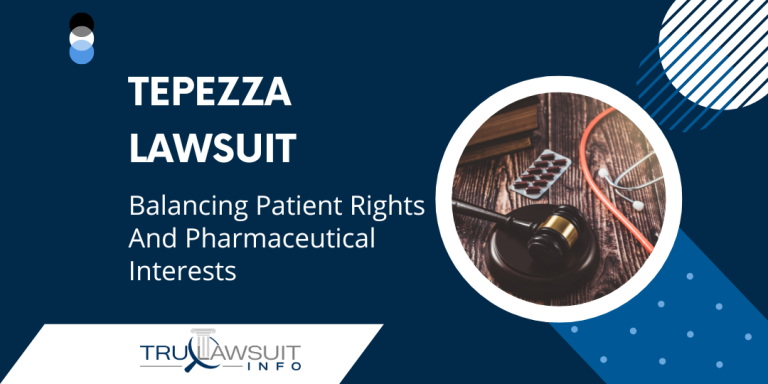
As we delve into this contentious issue, involving horizon therapeutics and multidistrict litigation, it becomes clear that striking a balance between patient rights and pharmaceutical interests is no easy task.
Join us as we explore the intricacies surrounding the Tepezza lawsuit and its implications for both patients, lawyers, and drug manufacturers.
Current Status and Developments of Tepezza Hearing Loss Lawsuit
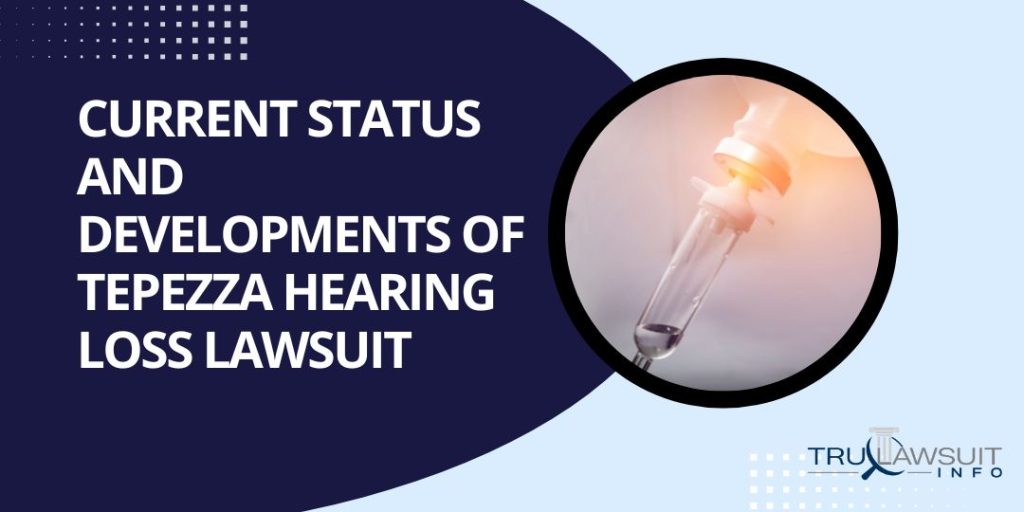
Stay updated on the latest developments in the Tepezza multidistrict litigation with Tepezza hearing damage lawsuit.
The ongoing legal proceedings surrounding this dangerous drug lawsuit have attracted significant attention, and it is crucial to remain informed about any new information that emerges regarding this specific aspect of the tinnitus lawsuit in federal courts.
The first Tepezza dangerous drug lawsuit has sparked concerns among patients experiencing tinnitus and other symptoms.
As more individuals come forward with their stories, it’s crucial to track the progress of this prescription drug lawsuit to understand its impact on future litigation involving medications that may cause potentially permanent hearing loss.
The Tepezza tinnitus and related side effects lawsuits shed light on a serious issue that needs addressing promptly.
Patients who have suffered from hearing loss and other treatment-related side effects after filing a Tepezza lawsuit deserve justice and compensation for their pain and suffering.
To ensure you are up-to-date with the latest developments:
- Stay connected with reputable news sources that cover multidistrict litigation and related topics. These sources often provide timely updates on court proceedings, settlements, and any significant breakthroughs in ongoing cases.
- Engage with online communities: Joining online forums or support groups dedicated to discussing medical lawsuits can provide valuable insights into the experiences of others affected by similar issues, such as related side effects and the risks associated with treatment.
- Consult a tinnitus law firm: If you believe you have a case related to Tepezza-induced hearing loss treatment, reach out to an experienced attorney who specializes in pharmaceutical litigation. They can review your situation and guide you through the necessary steps for filing a claim or joining existing class-action suits involving teprotumumab.
- Request a free case review today: Many law firms offer free case evaluations to assess the validity of potential claims.
Taking advantage of these consultations can help you understand the strength of your case and determine if pursuing legal action is the right course of action for you.
By staying informed and actively following the progress of the Tepezza hearing loss lawsuit, you can contribute to raising awareness about teprotumumab treatment for tinnitus and potentially influence positive changes in pharmaceutical safety protocols.
Patient Rights vs. Pharmaceutical Interests in Legal Battles
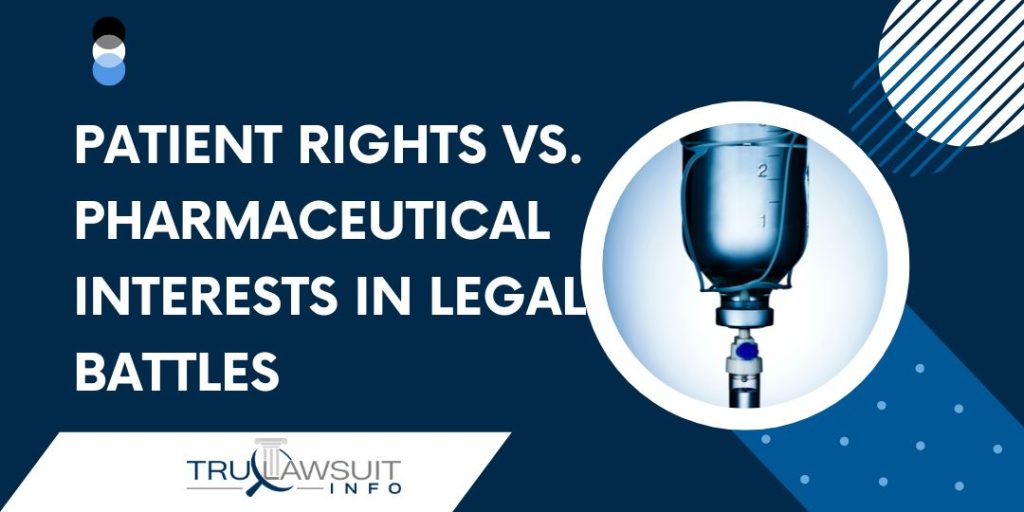
Patient rights often clash with pharmaceutical interests in various legal battles, including the Teprotumumab treatment and hearing loss lawsuits.
These conflicts arise due to differing priorities between patients seeking compensation and pharmaceutical companies defending their products.
Additionally, these conflicts can also arise in cases related to TED, or thyroid eye disease, which may require the use of Teprotumumab for treatment.
Clinical Trials Of Pharmaceutical Companies
One of the key factors contributing to clashes in the Tepezza lawsuit is the issue of clinical trials.
Pharmaceutical companies conduct extensive clinical trials to test the safety and efficacy of their eye disease treatment drugs before they are approved for public use.
However, there have been cases where patients claim that they were not adequately informed about potential health problems associated with the medication during these trials.
This lack of transparency can lead to concerns regarding patient rights and their ability to make informed decisions about their healthcare, which is why consulting a law firm may be necessary.
Moreover, patent protection plays a significant role in legal battles involving pharmaceutical companies and the development of new drugs.
These companies invest substantial resources into developing treatments for diseases, such as teprotumumab.
Patent protection allows them to recoup their investment by having exclusive rights over the production and distribution of the drug for a specific period.
However, this exclusivity can also limit patient access to affordable alternatives, leading to disputes between patients advocating for broader access and pharmaceutical companies protecting their financial interests.
Clinical Trials Of Pharmaceutical Companies With Tepezza Lawsuit
The Tepezza lawsuit serves as an example of tensions arising in courtrooms across the country due to alleged severe side effects experienced by patients after using teprotumumab for treating thyroid eye disease.
These patients claim that Pharmaceuticals did not provide adequate warnings about potential risks, including hearing loss and damage, associated with the treatment.
The legal process surrounding the Tepezza lawsuit involving treatment for hearing loss and hearing damage includes several stages, such as pretrial proceedings, oral arguments, and reaching a verdict or settlement.
During pretrial proceedings, both parties gather evidence and engage in negotiations aimed at resolving the disease-related dispute outside of court.
If no agreement is reached, the case proceeds to trial, where each side presents its arguments before a judge or jury.
In similar cases involving other drugs like teprotumumab, treatment outcomes for the disease and hearing loss have varied widely.
Some patients have received substantial financial compensation for damages suffered, while others have had their claims dismissed due to lack of evidence or other legal complexities.
The Tepezza lawsuit, specifically related to the treatment, is still ongoing, and its outcome will provide insights into the potential outcomes for patients involved in lawsuits against drug manufacturers.
Exploring Case Reports and Studies Linking Tepezza to Hearing Loss
Teprotumumab, also known as Tepezza, is a medication commonly prescribed for thyroid eye disease treatment.
However, recent concerns have arisen regarding its potential link to hearing loss.
Multiple case reports and studies have surfaced, shedding light on the horizon of hearing issues experienced by some Tepezza lawsuit patients.
Case reports have played a crucial role in bringing attention to potential hearing loss associated with Tepezza treatment.
These reports document individual experiences of patients who have undergone Tepezza infusions and subsequently developed hearing problems.
Symptoms reported range from mild hearing loss and tinnitus (ringing in the ears) to more severe cases of permanent hearing damage or total hearing loss caused by teprotumumab.
Reported Cases Linking Tepezza to Hearing Loss
One such report detailed the case of a 45-year-old woman who experienced sudden sensorineural hearing loss shortly after receiving her first round of Teprotumumab treatment, also known as Tepezza infusions.
While it is important to note that case reports represent isolated incidents rather than concrete evidence, they serve as valuable starting points for further investigation.
If you or a loved one have experienced similar side effects after receiving Teprotumumab treatment, contact Tepezza lawsuit for assistance.
To establish stronger scientific evidence, studies have been conducted to explore the potential link between Tepezza usage and hearing impairment.
A study published in a reputable medical journal examined a group of patients who had received Teprotumumab treatment and found that nearly 10% experienced some form of hearing loss as a side effect.
Tepezza on Cochlear Hair Cells in Mice
Another study investigated the impact of teprotumumab treatment on cochlear hair cells in mice models.
The findings revealed significant damage to these cells following exposure to high doses of the medication, providing further support for the hypothesis that teprotumumab may contribute to hearing loss.
While these case reports and studies provide compelling evidence for the effectiveness of teprotumumab treatment, it is essential to approach the topic with caution.
Not all Tepezza patients experience hearing loss, and further research is necessary to determine the exact mechanisms behind these potential side effects.
If you or a loved one has experienced hearing loss after receiving teprotumumab treatment, it may be beneficial to consult with a lawyer familiar with to explore your legal options.
Navigating Moral Dilemmas in the Tepezza Lawsuit
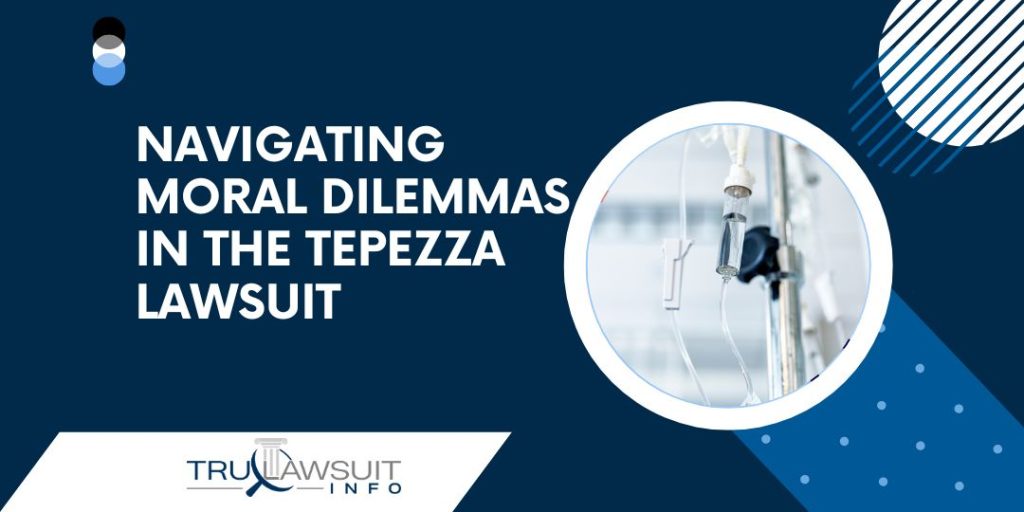
Delving into moral dilemmas arising from conflicting interests between patients affected by potential side effects of Tepezza and pharmaceutical companies defending their product’s safety brings to light several ethical considerations, particularly in the context of hearing damage and hearing loss.
Furthermore, we will reflect on the broader implications for medical ethics when balancing patient rights and pharmaceutical interests in similar lawsuits, keeping in mind the horizon of potential harm to patients’ hearing.
The Tepezza lawsuit has gained significant attention as patients allege hearing problems and loss cases related to the drug’s safety.
As these cases accumulate, a judicial panel is tasked with overseeing the proceedings and ensuring justice is served.
The plaintiffs seek punitive damages through a class action lawsuit, hoping to hold the pharmaceutical companies accountable for any harm caused by their product.
One crucial aspect that emerges from this legal battle is the issue of informed consent.
Patients who took Tepezza may argue that they were not adequately informed about potential risks of hearing damage associated with its usage.
This raises questions about whether pharmaceutical companies, fulfilled their duty of care towards patients by providing comprehensive information regarding potential side effects of hearing loss.
Corporate responsibility also plays a central role in this moral dilemma.
Pharmaceutical companies, have a duty to prioritize patient safety above all else.
However, they must also balance this responsibility with their obligation to shareholders and financial success.
When allegations arise regarding a drug’s safety, it becomes essential for these companies to address concerns promptly and transparently rather than dismissing them outright.
This ensures that no loss of hearing is overlooked on the horizon.
Innovation or Discourage Research For Life-saving Medications.
Navigating such moral dilemmas regarding Tepezza lawsuits and Tepezza infusions requires careful consideration of both patient rights and pharmaceutical interests.
While patients deserve compensation if they suffer hearing damage due to negligence or flawed products, it is equally important not to undermine innovation or discourage research that can lead to life-saving medications on the horizon.
When dealing with complex cases like the Tepezza lawsuit involving hearing damage and hearing loss, judges face the challenging task of weighing evidence, considering legal precedents, and making fair decisions.
Their role is to ensure justice is served while also considering the broader implications of their rulings.
It is crucial for judges to approach these cases with impartiality and a deep understanding of medical ethics related to hearing damage and hearing loss.
If you have been affected by Tepezza and are experiencing hearing loss, it is advisable to seek legal counsel.
Many law firms specializing in pharmaceutical litigation offer free case reviews where you can discuss your situation with experienced attorneys.
Contacting one of these firms can help you understand your options and determine if pursuing legal action for your hearing loss is appropriate.
How Past Lawsuits Have Addressed the Tug-of-War between Patients and Pharma Companies?
The ongoing struggle between patients seeking justice for hearing loss and pharmaceutical companies protecting their reputation has been a recurring theme in product liability cases.
Examining how previous lawsuits have addressed this tug-of-war can provide valuable insights into the Tepezza lawsuit and its potential outcome for hearing loss.
Multidistrict litigation (MDL) and class action lawsuits
Multidistrict litigation (MDL) and class action lawsuits have often been employed to consolidate similar claims related to hearing loss.
These legal mechanisms allow plaintiffs with similar grievances, such as hearing loss, to join forces, increasing their chances of success against powerful pharmaceutical firms.
In the case of Tepezza, it remains to be seen whether an MDL or a class action lawsuit will be pursued by the affected patients experiencing hearing loss.
One crucial aspect that courts consider in Tepezza lawsuits is establishing a link between the use of Tepezza and adverse events or injuries suffered by patients.
Plaintiffs must present compelling evidence demonstrating that their injuries were caused directly by the medication in question.
This burden of proof plays a significant role in determining liability and subsequent damages awarded in Tepezza hearing loss lawsuits.
TruLaw can help you navigate these complex legal matters.
In recent years, there have been several high-profile lawsuits related to drugs causing severe side effects or complications, including those related to hearing loss.
For instance, last week’s verdict against a pharmaceutical company found them liable for injuries caused by their product, which led to significant compensatory damages for affected individuals with hearing loss.
The outcome of these cases sets legal precedents that could influence the Tepezza lawsuit and its connection to hearing loss.
Tepezza For Thyroid Eye Disease
Tepezza is used as a treatment for thyroid eye disease (TED), an inflammatory condition affecting the eyes.
If plaintiffs can establish a clear connection between Tepezza usage and hearing loss or related conditions like inflammation, it strengthens their case against the manufacturer.
However, proving causation can be complex when dealing with medical conditions influenced by multiple factors.
Pharmaceutical companies often argue that they adequately warn healthcare professionals about potential risks associated with Tepezza through labels and prescribing information.
They may claim that any injuries suffered by patients were a result of pre-existing conditions or other factors unrelated to the drug.
These arguments can create challenges for plaintiffs in Tepezza lawsuits seeking compensation for Tepezza’s hearing loss.
Courts consider various factors, including the duration of drug usage and the timeframe between administration and the occurrence of adverse events, especially hearing loss.
If a significant number of patients experienced injuries within weeks or months of taking Tepezza, it could strengthen the argument that the drug played a role in causing harm to their hearing.
The Role of Patient Groups in Shaping the Narrative of the Tepezza Lawsuit
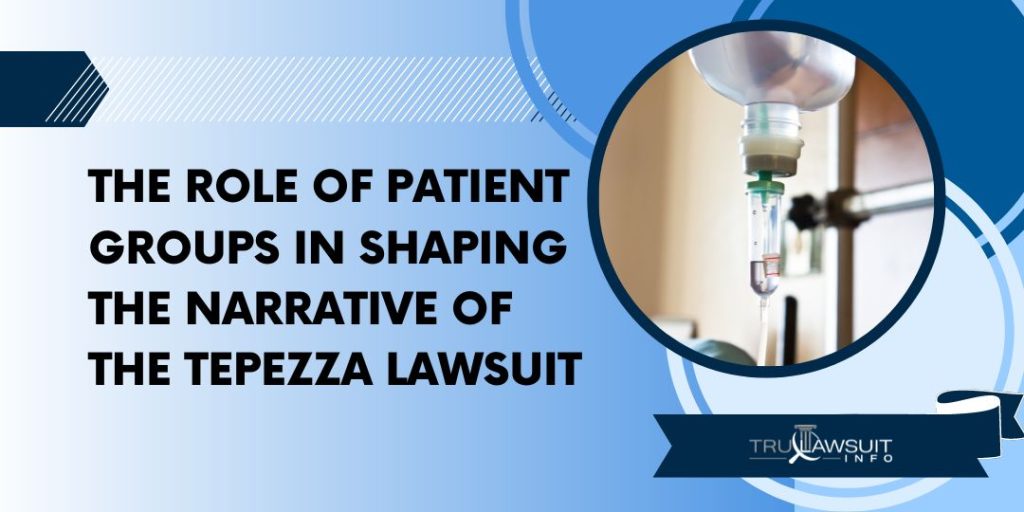
Patient advocacy groups play a crucial role in shaping public opinion and influencing legal proceedings in cases like the Tepezza lawsuit, especially those related to hearing loss.
These groups are dedicated to raising awareness about potential side effects, supporting individuals affected by hearing loss and advocating for changes within the healthcare system.
In the context of the Tepezza lawsuit, patient groups focused on hearing loss have taken specific actions that have had a significant impact on public perception.
Provide Support and Guidance to Plaintiffs
One important aspect of patient groups’ involvement in lawsuits is their ability to provide support and guidance to plaintiffs with hearing loss.
When individuals with hearing loss experience adverse effects from medications like Tepezza, they often feel overwhelmed and unsure about how to proceed legally.
Patient advocacy groups step in to offer assistance by connecting them with lawyers who specialize in pharmaceutical litigation for hearing loss.
These lawyers form the legal teams that represent plaintiffs with hearing loss throughout the lawsuit process.
Patient groups also play a key role in raising awareness about the potential side effects associated with Tepezza, including hearing loss.
They disseminate information through various channels, including social media platforms, websites, and support group meetings.
By sharing personal stories and experiences of victims who have suffered from vision issues or tissue damage as a result of using Tepezza, these groups aim to educate others about the risks involved, including hearing loss.
Advocate for Changes Within the Healthcare System
In addition to raising awareness, patient advocacy groups actively advocate for changes within the healthcare system to prevent hearing loss incidents from occurring in the future.
They work towards improving drug safety regulations, ensuring better communication between pharmaceutical companies and patients with hearing loss, and pushing for stricter oversight during clinical trials.
The impact of patient group actions related to the Tepezza lawsuit has been substantial in raising awareness about hearing loss.
Their collective efforts have drawn attention to this particular case and highlighted its significance within both the medical and legal communities.
By organizing protests outside pharmaceutical company headquarters or participating in class action lawsuits against manufacturers of Therapeutics, patient groups have demanded accountability and fair compensation for the victims of hearing loss.
The involvement of patient groups has also influenced public perception of the Tepezza lawsuit.
Through their advocacy work, these groups have portrayed the plaintiffs as individuals who have suffered from hearing loss due to negligence or wrongdoing on the part of pharmaceutical companies.
Impact and Future of the Tepezza Lawsuit
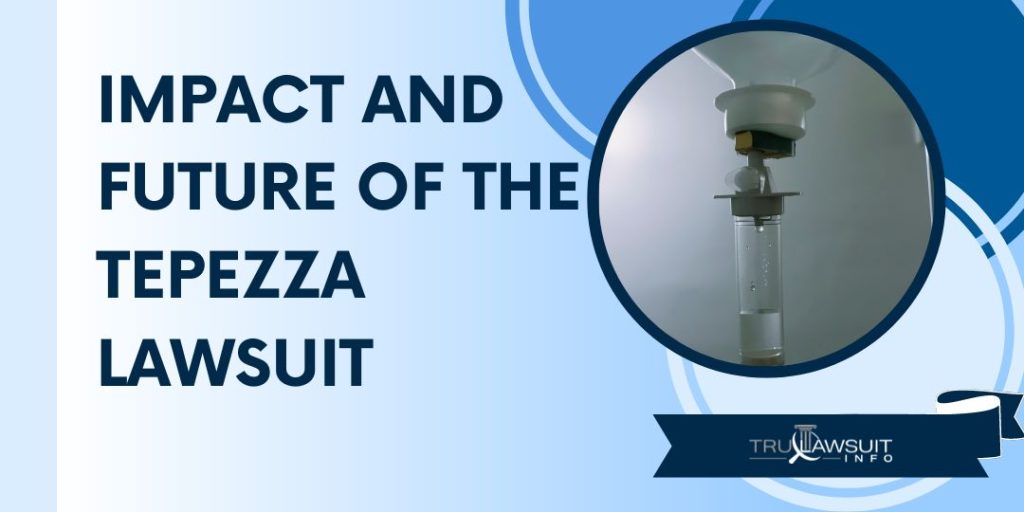
The Tepezza lawsuit, which has gained significant attention within the healthcare industry, is raising questions about its potential consequences and future implications for hearing loss.
As we assess the potential outcomes resulting from a verdict or settlement in this case, it is important to consider how it might shape future regulations, drug development practices, and litigation involving pharmaceutical companies related to hearing loss.
One key aspect to examine is the impact on patients’ rights.
The Tepezza lawsuit highlights the importance of holding pharmaceutical companies accountable for hearing loss.
A favorable verdict or settlement could set a precedent for other patients harmed by negligence or defective drugs.
Seeking justice and pursuing similar lawsuits against pharmaceutical giants would be empowering.
Moreover, this case may prompt regulatory bodies to reevaluate their oversight of drug development processes, particularly in relation to hearing loss.
If any wrongdoing is proven in relation to Tepezza’s safety or efficacy in treating hearing loss, regulatory agencies may tighten their scrutiny over clinical trials and approval procedures.
Stricter guidelines could be implemented to ensure that adequate testing is conducted before new drugs for hearing loss are introduced into the market.
This would aim to prevent potential harm caused by rushed approvals or inadequate research in the field of hearing loss treatment.
Litigation involving pharmaceutical companies
Litigation involving pharmaceutical companies could also be influenced by the outcome of the Tepezza lawsuit.
A successful class action lawsuit against Therapeutics, the manufacturer of Tepezza, might encourage more individuals with hearing loss harmed by medications to come forward and join forces in pursuing legal action.
It could lead to an increase in class action lawsuits against other pharmaceutical companies accused of similar wrongdoing, like being linked to permanent hearing loss.
Looking ahead, one must consider how this case might impact future drug development practices.
Pharmaceutical companies may become more cautious when introducing new drugs into the market if they fear facing costly litigation like that seen with Tepezza.
They may invest additional resources in comprehensive testing and data collection during clinical trials to minimize risks associated with their products and ensure compliance with hearing regulations.
Settlements reached in high-profile lawsuits often result in financial compensation for affected parties.
The average Tepezza settlement, if a hearing is reached, could serve as a benchmark for future cases involving similar circumstances.
Understanding Pharmaceutical Companies' Defense Strategies in Lawsuits
Pharmaceutical companies facing hearing lawsuits, such as the Tepezza lawsuit, often employ various defense strategies to protect their interests.
These hearing strategies aim to challenge causation claims, question study methodologies, or emphasize regulatory compliance.
To gain insight into these common defense tactics and their impact on legal battles against drug manufacturers, it is crucial to analyze past hearing cases.
Defense Strategies in Lawsuits
One of the primary defense strategies employed by pharmaceutical companies in dangerous drug lawsuits is challenging causation claims.
They may argue that the alleged injuries or harm suffered by plaintiffs were not directly caused by their product.
With a reason that it can treat thyroid eye disease.
This tactic involves scrutinizing medical records and seeking expert opinions to cast doubt on the link between the drug and the reported side effects.
By doing so, they attempt to undermine the plaintiff’s case and avoid liability, especially during the hearing.
Another approach used by pharmaceutical companies in Tepezza lawsuits is questioning study methodologies and hearings.
They may argue that the scientific studies presented as evidence lack credibility or have methodological flaws.
This strategy aims to create uncertainty around the validity of research findings linking their product to adverse effects.
Emphasizing regulatory compliance is another common defense strategy employed by pharmaceutical companies in product liability lawsuits.
They may assert that their drug was approved by relevant regulatory authorities after rigorous testing and evaluation processes, ensuring it met all necessary safety requirements at the time of approval.
This defense strategy seeks to shift some responsibility onto regulatory agencies for any alleged shortcomings in evaluating risks associated with the medication, ultimately protecting the company’s reputation and minimizing potential legal consequences.
Through careful examination of past cases and understanding of these tactics, it becomes evident how drug manufacturers navigate legal battles to protect their interests in the hearing process.
Conclusion
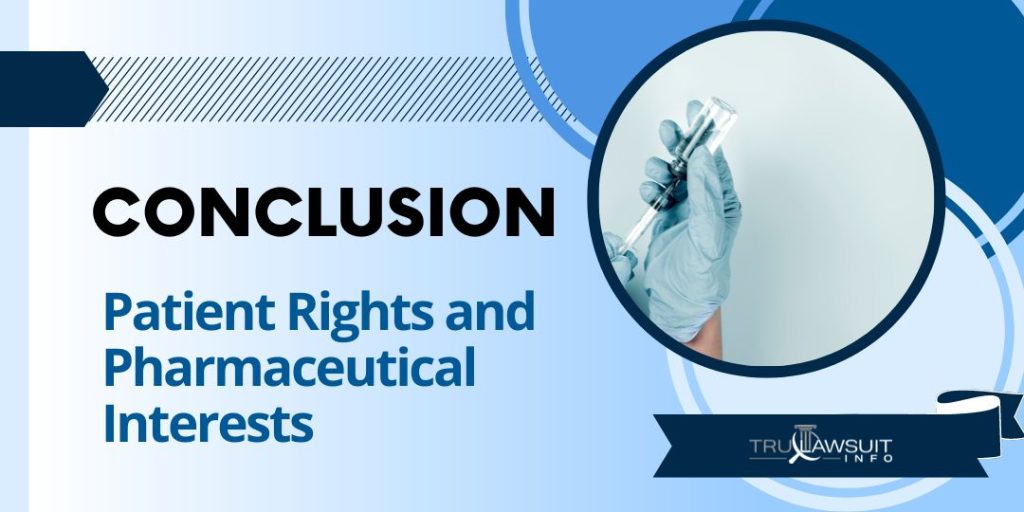
In conclusion, the Tepezza lawsuit has brought to light important considerations regarding medical professionals and their stance in pharma lawsuits.
The current status and developments of the Tepezza hearing loss lawsuit have highlighted the need to balance patient rights with pharmaceutical interests in legal battles.
Case reports and studies linking Tepezza to hearing loss have further emphasized the importance of understanding the potential risks associated with this medication.
Navigating moral dilemmas within the Tepezza lawsuit has proven challenging, as it involves weighing the well-being of patients against the actions of pharmaceutical companies.
Examining past lawsuits reveals a recurring tug-of-war between patients and pharma companies in the context of hearing and Tepezza.
However, patient groups play a crucial role in shaping the narrative surrounding these lawsuits, advocating for their rights and seeking justice.
It is imperative for individuals affected by the Tepezza hearing lawsuit to take action by staying informed, joining Tepezza patient groups, and seeking legal advice if necessary.
By doing so, they can contribute to shaping a fair outcome for all parties involved in the Tepezza hearing.
Frequently Asked Questions
-
Tepezza has been linked to hearing loss, according to case reports and studies.
It is important to consult your healthcare provider regarding any concerns or questions about potential risks associated with this medication.
-
To stay informed about any updates or changes in the Tepezza lawsuit, it is recommended to follow reliable news sources, consult legal professionals specializing in pharmaceutical litigation, and engage with patient advocacy groups.
Keeping up with the latest information on the hearing is crucial.
-
Patient groups play a crucial role in shaping the narrative surrounding the Tepezza lawsuit, especially when it comes to advocating for patients’ hearing rights.
They raise awareness about potential risks associated with medications and can help bring attention to hearing issues that need addressing.
-
If you believe you have experienced adverse effects from taking Tepezza and are concerned about your hearing, it is important to consult with your healthcare provider as soon as possible.
They can evaluate your situation and provide appropriate guidance on how to proceed.

Attorney Jessie Paluch, founder of TruLawsuit Info, has over 25 years of experience as a personal injury and mass tort attorney, and previously worked as an international tax attorney at Deloitte. Jessie collaborates with attorneys nationwide — enabling her to share reliable, up-to-date legal information with our readers.
Legally Reviewed
This article has been written and reviewed for legal accuracy and clarity by the team of writers and legal experts at TruLawsuit Info and is as accurate as possible. This content should not be taken as legal advice from an attorney. If you would like to learn more about our owner and experienced injury lawyer, Jessie Paluch, you can do so here.
Fact-Checked
TruLawsuit Info does everything possible to make sure the information in this article is up to date and accurate. If you need specific legal advice about your case, contact our team by using the chat on the bottom of this page. This article should not be taken as advice from an attorney.
You can learn more about the Tepezza Hearing Loss Lawsuit by visiting any of our pages listed below:
Here, at Tru Lawsuit Info, we’re committed to helping victims get the justice they deserve.
To do this, we actively work to connect them with attorneys who are experts in litigating cases similar to theirs.
Table of Contents
Tru Lawsuit Info is a reliable source of information about issues that may affect your health and safety, such as faulty products, data breaches, and environmental hazards.
Our team of experienced writers collaborates with medical professionals, lawyers, and advocates to produce informative articles, guides, and other resources that raise awareness of these topics.
Our thorough research provides consumers with access to reliable information and updates on lawsuits happening around the country. We also can connect consumers with attorneys if they need assistance.
Here, at Tru Lawsuit Info, we’re committed to helping victims get the justice they deserve.
To do this, we actively work to connect them with attorneys who are experts in litigating cases similar to theirs.
